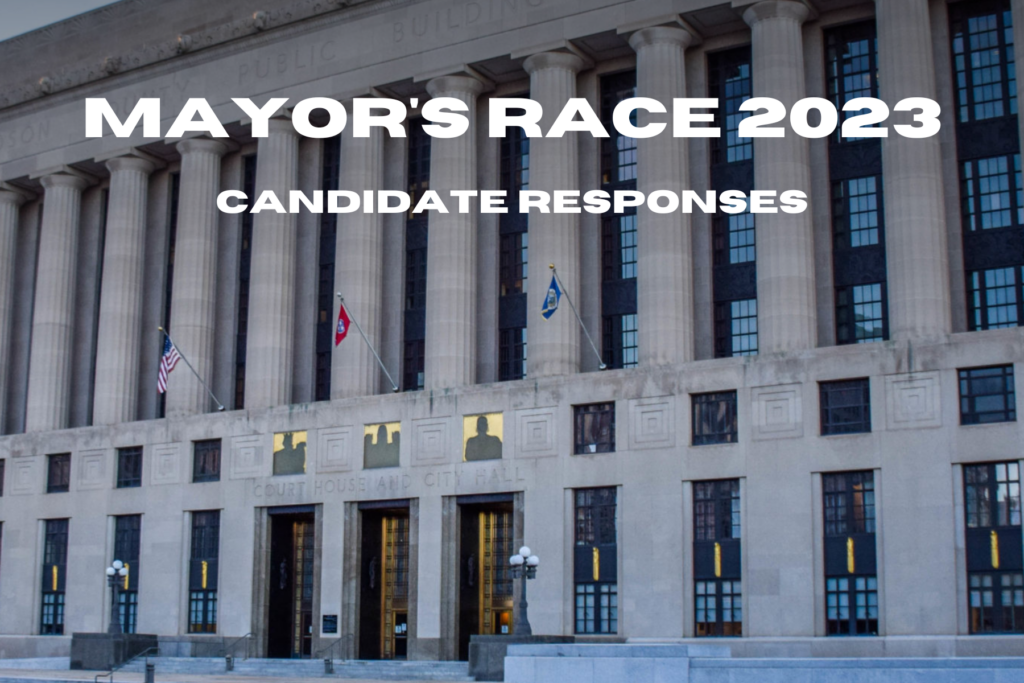
Early balloting opens July 14, as Nashville voters head to the polls to elect the city’s next mayor. Choices are far from limited — with a field that rounds out to 12 candidates.
WPLN News solicited questions from our audience on the issues they are most concerned about. We’ve selected five that we presented to all candidates — on the topics of gun violence, affordable housing, public transportation, the environment and relations with the Tennessee General Assembly.
As Nashville continues to grow, the shortage of affordable housing is perpetually on the minds of many voters. One listener posed the question:
How will you address the need for affordable — not market rate — housing in Nashville?
Many in the field shared similar responses: reliance on existing funds, like the Barnes Housing Fund, emerged as a common theme, as did support of public-private partnerships. However, there were some diverging suggestions.
Below are answers provided by the 10 candidates who wrote in response to WPLN News. Candidates were asked to limit their responses to around 200 words and are published in full. Responses are organized alphabetically.
 Courtesy Natisha Brooks
Courtesy Natisha Brooks Natisha Brooks
Brooks is a former educator who operated a home school academy. She ran for congressional seats in Republican primaries in 2020 and 2022 and is a self-described “Christian conservative constitutionalist.” She says:
I will work with developers and non-profits to reserve units for “Income Based/ Affordable Housing”. Non-profits such as “TIF” will be worked with regarding the seniors and the disabled to have reserved housing for these citizens. Companies that come to Nashville will be asked to help with fund “Income Based/Affordable Housing” for Nashville Residents. Housing for Special Needs individuals will be considered for “Income Based/ Affordable Housing.” Homelessness individuals will receive housing assistance with participating hotels and community centers.
 Courtesy Senator Heidi Campbell Facebook
Courtesy Senator Heidi Campbell FacebookHeidi Campbell
Campbell currently represents Tennessee’s 20th district in the state Senate. Earlier this year, she ran for the U.S. House of Representatives in the race for Tennessee’s recently redistricted 5th congressional district. She previously served as the mayor of Oak Hill, a small town in Davidson County that maintains its own municipal government. She says:
We have an affordable housing deficit. The pandemic, record-low interest rates, and an influx of new residents have driven prices even further out of reach for many residents. The lack of affordable housing has priced people out of the market and led to a sharp increase in homelessness. Housing advocates estimate 20,000 people in our city are currently without permanent shelter. As this problem worsens, one of our biggest challenges will be working with a state government that has eliminated our ability to require affordable housing as part of new developments. We must increase the supply of affordable housing by expanding on existing public and private partnerships, such as the Barnes Housing Trust Fund. My administration’s plan to solve this crisis has three parts: identifying viable land, development, and management. By targeting underutilized parcels, incentivizing private developers, and forming relationships with community organizations, we can create a powerful, permanent solution to our affordable housing crisis. I will work with Metro’s Affordable Housing Task Force, THDA, MDHA, the Planning Commission, and the Homeless Impact Division to expand revenue streams and craft policy. We will also review zoning and regulatory laws, reduce barriers to developing and preserving affordable housing, and investigate expanding the Payment in Lieu of Taxes Program.
 Courtesy Jim for Nashville Facebook
Courtesy Jim for Nashville FacebookJim Gingrich
Gingrich, the former Chief Operating Officer of Wall Street firm AllianceBernstein, retired to his post in 2020. He is not originally from Tennessee, but was part of the team who worked to move the asset management company’s headquarters to Nashville in 2018. He says:
This is an issue we have discussed for over a decade, and in that time, done multiple affordable housing studies. Each one tells us the problem is worse than the last time we studied it. People are being priced out, and the situation is urgent. We cannot have a city where the people who serve our city — our teachers, firefighters, police officers, and other Metro workers — cannot afford to live in the city they serve. Our leadership has kicked the can on this issue for so long that we are at a critical point, and the magnitude of the challenge is now measured in tens of thousands of units needed and billions of dollars to make it happen. That’s why we need leadership that will work for the people, instead of monied interests, to address the affordable housing crisis. And it starts with three things:
● Properly invest in the Barnes fund, turbocharging the non-profit sector to create even more affordable housing
● Make use of the land the city owns that is ripe for affordable housing development
● Most importantly, harness the power of the private sector to make the multibillion dollar investments in housing and make it easier for affordable housing to be built.
 Courtesy Sharon Hurt campaign
Courtesy Sharon Hurt campaign Sharon Hurt
At-large Councilmember Sharon Hurt has served on the Metro Council since 2015. She worked with nonprofit Jefferson Street United Merchants Partnerships for 23 years, stepping down from her role as president and CEO in 2021. She says:
If Habitat for Humanity can build a house in a day, why can’t we get 12 crews together and build 12 houses in a week? I plan to approach the housing crisis from many different angles. First, I will capitalize on the acres of empty government-owned land that we already have in the Bordeaux area and designate these plots for affordable and attainable housing. That’s hundreds of units of affordable housing right there. Additionally, I will push to develop workforce housing for our teachers, firefighters, and the other public servants that make Nashville the “It” city. And lastly, I will incentivize developers to build affordable housing through tax credits. At every step of my plan, I will use the 25+ years of experience I have in leading countless nonprofits, organizations, and committees to effectively cooperate with all parties involved. From meeting with developers to streamline the building permit process to lobbying Council Members to zone more areas for affordable housing, I will form a coalition of developers, grassroots organizations, and Council Members to effectively execute my plan and end the affordable housing crisis in Nashville.
 Courtesy Stephanie Johnson campaign
Courtesy Stephanie Johnson campaign Stephanie Johnson
Johnson is the creative director of a skincare company and has also served in the Americorps Vista program and the Nashville Mayor’s Youth Summit Council. In 2019, she ran for the District 7 Metro Council seat. She says:
Mayor Cooper had a site built to hold metro accountable for the money we are spending on projects in our communities, from schools to parks. We will integrate our low-income/affordable housing stock into that map per district, creating a scale that shows how much is in each district. This will in return help hold our communities and council members accountable for the housing in their district and ensure we are not losing valuable housing stock. We will move to land banking some of our metro property to build out supportive housing and then support our local nonprofits and community groups through the barnes funds buying property to keep it affordable and creating intentional communities and co-ops (great for trailer parks).
 Courtesy Freddie O'Connell
Courtesy Freddie O'Connell Freddie O’Connell
Councilmember Freddie O’Connell
Metro Councilmember and software architect O’Connell has represented District 19 since 2015. Before that, he chaired Metro Transit Authority’s board and led the Salemtown Neighbors Neighborhood Association and served on various other boards and committees. He says:
As mayor, I will create a standalone Office of Housing to strengthen connections across multiple Metro departments including Planning, WeGo, and NDOT, as well as produce and implement new projects and policies. I’ve created a Metro department before as a Councilmember – the Office of Homeless Services – and the two can work hand in hand to ensure that our housing strategies are inclusive of all income and abilities. I know what works and what doesn’t in Metro and will cut the red tape that leads to delays on affordable housing projects and makes it difficult for nonprofits, faith-based organizations, and others looking to make a difference in this space to do so. And we’ll accelerate usage of a catalyst fund that is designed to acquire land quickly for engaging the private sector in production of affordable housing. Metro is finally in the process of preparing a comprehensive inventory of public land and buildings so we know where we can easily build on public land. And our administration will work to implement the ambitious affordable housing goals in the East Bank Vision Plan now that Metro will be the master developer for the land around the new Titans stadium. I’m also fully committed to dedicating $30 million to the Barnes Fund each year. This fund has been one of our most important tools for leveraging multiple funding sources to create affordable housing.
 Shannon Fontaine Courtesy Alice Rolli campaign
Shannon Fontaine Courtesy Alice Rolli campaignAlice Rolli
Alice Rolli
Rolli served as campaign manager for Tennessee Republican Sen. Lamar Alexander during his 2014 reelection bid. She also worked in the Tennessee Department of Economic and Community Development under Gov. Bill Haslam. She says:
When my husband concluded his military service we settled in Edgehill about 12 years ago. Edgehill is an IMBY (In My Back Yard) neighborhood – where a great deal of housing, including affordable housing, has been built along our city’s transit corridors. To spur on additional housing stock and increase supply – we need to review all of our tools (MDHA, Barnes, Catalyst Fund) but also figure out what is missing from our portfolio and bring it to the table. We need to reset our relationship with the THDA to ensure that state programs are benefitting residents of Davidson County. We need to performance manage projects to be sure that every taxpayer dollar is effectively used. We also need to look at how we can get creative to address backlogs in permitting – for example legislation recently passed in the GA to allow electricians to participate in electrical inspections. We should get smart and focused on identifying other bottlenecks that may be slowing the ability to bring housing online which contributes to higher costs. Finally, we should not raise taxes so that our existing landlords of older housing stock are not required to pass on tax hikes to renters.
 Courtesy Metro Nashville Government
Courtesy Metro Nashville Government Vivian Wilhoite
Wilhoite formerly served on the Metro Council, representing District 29 from 2003-2011. In 2016, she was elected as the Davidson County Property Assessor Race, and was re-elected in 2020. She says:
How will I address the need for affordable housing? Not market rate, but housing in Nashville? Well, the only way to bring down the cost of housing in Nashville is to increase the supply of housing options. I would look at leasing metro owned land to developers to build affordable housing and also partner with the private sector and nonprofits in Nashville to offer more affordable housing solutions. I will look at using Metro-owned vacant buildings and schools that can be renovated for workforce housing and transition and transitional housing. But again, this will require public private partnerships with developers and to incentivize developers, where appropriate, to build affordable housing, rental units and single-family housing. Local government cannot do it alone.
 Courtesy Matt Wiltshire
Courtesy Matt Wiltshire Matt Wiltshire
Wiltshire previously worked for the Metropolitan Development and Housing Agency. He says:
Nashville has gotten far too expensive for most folks to be able to raise a family. That’s why in 2019 I helped craft an ambitious affordable housing plan and left the Mayor’s Office to join the city’s housing authority to work on making Nashville a more affordable place to live. We made some real progress – in 3 years we helped create more than 4,000 units of housing that Nashvillians can actually afford. But there is a LOT of work left to do. We need to add housing units across the price spectrum and there are different tools to accomplish that goal at different price points. First, we need to increase our investments into the Barens Housing Fund. Second, we should continue to expand the Envision plan, which is transforming public housing sites from areas of concentrated poverty into thriving mixed-income neighborhoods – without displacing residents. We need to expand public-private partnerships like the Housing Resiliency Fund at The Housing Fund, which helps homeowners avoid getting priced out of the city by rising property taxes. We should invest more in home weatherization efforts to help low-income seniors reduce energy costs and stay in their homes. We also need to work closely with the private sector to simply increase the supply of housing that is being built. Finally, we have a web of programs that help folks who’re struggling to stay in their home. We will add housing navigators who will help folks, especially our seniors, take advantage of the support available.
 Courtesy Jeff Yarbro campaign
Courtesy Jeff Yarbro campaign Jeff Yarbro
Yarbro has served as a Democratic state senator since 2014, representing District 21. He spent four years as the Senate minority leader, and also works as an attorney at Bass, Berry & Sims law firm. He says:
Affordable housing isn’t just a top concern of voters, it’s a strategic and economic imperative for the future of Nashville. We need to build housing that makes up for the actual deficit in affordable housing – that deficit is projected soon to be over 30,000 units. As the sponsor of the original legislation authorizing Metro to make direct appropriations to build and incentivize affordable housing and to obtain property for the construction of affordable housing, I believe those efforts have been important but thus far insufficient. We need a community-wide plan to address a problem that affects every neighborhood in the city. First, we must more effectively leverage government-owned properties and Metro investments to advance more ambitious developments both in the type of housing that’s attainable for the teachers, police officers, and firefighters who make this city work and in affordable housing accessible to lower-income residents. Second, we must preserve affordable housing where it is through better use of property tax freezes for seniors living on a fixed income, property tax waivers for nonprofits offering housing solutions, and nonprofit partnerships focused on the repair and rehabilitation of affordable housing where it stands. Third, we must help residents avoid the obstacles to finding a home – rental assistance to avoid eviction, assistance with building and repairing credit, and promotion of savings for down payments.
Correction: This story initially misstated the date that early voting begins. That balloting begins Friday, July 14.

